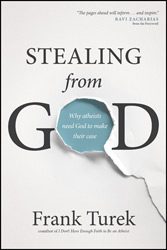 Author Interview with Frank Turek
Author Interview with Frank Turek
Your new book has the provocative title, Stealing from God: Why Atheists Need God to Make Their Case. The back cover says: “What if your best arguments against God prove that He really exists?” How are atheists stealing from God and proving He exists?
Atheists are using aspects of reality to argue against God that wouldn’t exist if atheism were true. In other words, when atheists give arguments for their atheistic worldview, they are stealing from a theistic worldview to make their case. In effect, they are stealing from God in order to argue against Him. These aspects of reality are so much part of our common sense that many atheists seem to take them for granted. But they simply can’t exist if atheism is true. Theism can explain them, but atheism cannot.
Stealing from God is organized around the acronym CRIMES, which you say represents the intellectual CRIMES atheists are making. What are those CRIMES?
“CRIMES” stands for Causality, Reason, Information & Intentionality, Morality, Evil and Science. These are all aspects of reality that atheists say disprove God, when, in fact, these things wouldn’t exist without God. I spend a chapter on each one of the CRIMES in the book.
 In the Causality chapter, you claim that some atheists are endangering science in order to avoid God as the cause of the Big Bang. What do you mean by that?
In the Causality chapter, you claim that some atheists are endangering science in order to avoid God as the cause of the Big Bang. What do you mean by that?
The Big Bang gives atheists fits because the evidence shows that spacetime and matter had a beginning. Well, if spacetime and matter had a beginning, then the cause can’t be made of spacetime or matter. The cause must be spaceless, timeless, immaterial and extremely powerful to create universe out of nothing. Those are attributes of a theistic God.
In order to avoid this conclusion, popular atheist and physicist Lawrence Krauss casts doubt on the law of causality. In discussing the “vexing problem” of the beginning of the universe, Krauss says, “All things that begin may have a cause, even if the cause is rather obscure and purposeless.”
“May” have a cause? What happened to simply “all things that begin do have a cause”? Why does he suddenly doubt the law of causality? By doing so he casts doubt on the very discipline he’s trying to champion—science. The entire scientific enterprise depends on the cause-and-effect relationship. If things can come into existence without causes, then how can anyone do science?
If atheists are going to claim that the universe can pop into existence uncaused out of nothing, then why doesn’t everything do so? Why don’t iPads, Teslas, atheist books, and pizzas pop into existence out of nothing? If you’re hungry for a pizza right now, does it make more sense to order one or just wait and hope? Talk about faith.
But who made God?
No one because God is eternal. He is the unmoved mover—the uncreated creator. The evidence shows that there must be such a being. Here’s why.
Contrary to what many atheists seem to believe, the law of causality does not say that everything has a cause. The law of causality says that everything that has a beginning has a cause, or every effect has a cause. But not everything can be an effect. In order for there to be motion or change at all, there has to be something that isn’t an effect but an eternal, uncaused first cause—an “unmoved mover.” We can’t go on an infinite regress of causes. When we trace the causal chain back, it must end at a self-existent, uncaused first cause.
So when atheists ask, “Who made God?” they misunderstand the law of causality and the nature of God. They are thinking the God of the Bible is a created, Zeus-like idol. But that’s not the God of the Bible, who is the self-existent, uncaused first cause and sustainer of the universe. Since God created time, He is timeless or eternal. If you’re timeless, you don’t have a beginning and thus don’t have a cause.
In the chapter on reason you say that every time atheists attempt to use logic and reason to disprove God, they are actually proving He exists. How so?
Atheists claim to be champions of reason. They even organize “reason” rallies and call themselves “free thinkers.” The problem is there is no “free” or thinking going on if atheism is true. If we are just molecules in motion as atheistic materialism asserts, then we are nothing but moist robots whose every thought is the result of a previous natural cause. Free-thinking can’t exist in such a world. The category of immaterial reality is not available to the atheist, but that’s what the laws of logic and our ability to reason require. On the other hand, reason is well explained by a theistic God whose very nature is rational—“in the beginning was the Word” (or rationality) as the opening line of John’s gospel declares.
Ironically, atheists must rely on faith rather than reason. Being materialists, atheists Sam Harris and Daniel Dennett claim that consciousness, and free will are illusions (one wonders if they freely came to those conclusions while conscious!). But if they are correct, then “you” and “me” don’t really exist and neither do arguments—we are just molecular machines who are just reacting not reasoning.
This is the central problem that emerges repeatedly in atheist arguments: Atheists exempt themselves from their own claims and theories. If free will is an illusion and everyone is a molecular machine, then why are Harris and Dennett acting as if they can freely and reasonably arrive at atheistic conclusions?
The bottom line is that atheism cannot be shown to be true in principle. It has destroyed all the tools necessary to do the job. In order to construct any valid argument for atheism, the atheist has to steal tools from God’s universe because no such tools exist in the world of atheism. They are stealing from the Being who makes reason possible in the first place. So atheists can assert that atheism is true, but they can’t rely on arguments to support the claim. They have to accept it on blind faith.
You have a chapter on how morality points to God. But atheists say science can help us know what’s right. You don’t need God.
That’s what atheist Sam Harris says, but he’s addressing the wrong question. The question isn’t how we know what’s Right, but why does an authoritative standard of Rightness exists in the first place?
You may come to know about objective morality in many different ways: from parents, teachers, society, your conscience, etc. (Harris talks about brain states.) And you can know it while denying God exists. But that’s like saying you can know what a book says while denying there’s an author. Of course you can do that, but there would be no book to know unless there was an author! In other words, atheists can know objective morality while denying God exists, but there would be no objective morality unless God exists.
Science might be able to tell you if an action may hurt someone—like if giving a man cyanide will kill him—but science can’t tell you whether or not you ought to hurt someone. Who said it’s wrong to harm people? Sam Harris? Does he have authority over the rest of humanity? Is his nature the standard of Good? Sam Harris has to steal an objective moral standard from God to get his atheistic system off the ground.
But can’t morality be explained by evolution?
I give six reasons why evolution can’t explain morality. Here’s just one: You can’t explain an immaterial moral law by a material biological process. Justice is not made of molecules. Moral laws are prescriptive and come from authoritative personal agents. Biological processes are descriptive and have no authority to tell you what to do. How could a mutating genetic code have the moral authority to tell you how you ought to behave?
Christians and atheists often disagree over politics and human rights. But you say that atheists unwittingly steal from God in order to argue for some of their political rights, whether it’s abortion, same-sex marriage, government healthcare or whatever. How so?
By what objective standard are abortion, same-sex marriage, taxpayer-provided health care, and the like, moral rights? There isn’t such a standard in an atheistic universe. If there is no God, all moral questions are matter of human opinion. So atheists must steal the grounds for objective moral rights from God while arguing that God doesn’t exist.
Atheists are caught in a dilemma. If God doesn’t exist, then objective moral rights don’t exist, including all those that atheists support. If God does exist, then objective moral rights exist. But those rights clearly don’t include cutting up babies in the womb, same-sex marriage, and other invented absolutes contrary to every major religion and the “self-evident” natural law. (It’s ironic that atheists often call theists arrogant for deferring to God as the authority on morality, when atheists think they are the authority on morality.)
But doesn’t the Constitution provide us with rights?
The Constitution legally codifies rights, but it’s not the ultimate source of rights. What if we change the Constitution? Do your rights vanish?
While it’s true that you don’t have to appeal to God to write laws, you do have to appeal to God if you want to ground them in anything other than human opinion. Otherwise, your “rights” are mere preferences that can be voted out of existence at the ballot box or at the whim of an activist judge or dictator. That’s why our Declaration of Independence grounds our rights in the Creator.
However, my point in the book isn’t about how we should put objective human rights into human law. My point is, without God there are no objective human rights. There is no right to abortion or same- sex marriage. Of course, without God there is no right to life or natural marriage either!
In other words, no matter what side of the political aisle you’re on—no matter how passionate you believe in certain causes or rights—without God they aren’t really rights at all. Human rights amount to no more than your subjective preferences. So atheists can believe in and fight for rights to abortion, same-sex marriage, and taxpayer-provided entitlements, but they can’t justify them as truly being rights. They are preferences, not rights.
Doesn’t evil disprove God?
No, evil disproves atheism. Evil can’t exist unless good exists, and good can’t exist unless God exists. In other words, there can be no objective evil unless there is objective good, and there can be no objective good unless God exists. If evil is real—and we all know it is—then God exists.
We could put it this way: The shadows prove the sunshine. There can be sunshine without shadows, but there can’t be shadows without sunshine. In other words, there can be good without evil, but there can’t be evil without good; and there can’t be objective good without God. So evil may show there’s a devil out there, but it can’t disprove God. Evil actually boomerangs back to show that God exists.
But isn’t the God of the Old Testament evil?
Atheists try to have it both ways. On the one hand, atheists claim there is no good or evil—we just “dance to the music of our DNA.” On the other hand, atheists are outraged at the “evil” God of the Bible and all the evil done in His name. Which is it?
But to answer your question directly: no, the God of the Old Testament is not evil as I explain in the book. While the God of Old Testament seems to present a moral problem for Christians, atheists have no grounds by which to object to such a God. When Richard Dawkins complains about the “evil” God of the Old Testament, he has to steal goodness from God to even make sense of his complaint. He has to sit in God’s lap to slap His face.
Atheists claim that there’s a war between science and Christianity. But you say that’s not true—the war is actually between science and atheism. How so?
Because theism can explain why the tools of science exist but atheism cannot. You need immaterial realities such as the laws of logic, the law of causality, and the reliability of observation to do science that atheism can’t provide.
In fact, we wouldn’t be able to do science reliably if atheism were true. Materialism scuttles free will and destroys our confidence in everything we think. As C. S. Lewis put it, “Unless human reasoning is valid no science can be true.” Even atheist Thomas Nagel admits this. He writes, “Evolutionary naturalism provides an account of our capacities that undermines their reliability, and in doing so undermines itself.”It also ignores the immaterial realities that are necessary for anyone to do science in the first place.
Now, I’m not saying atheists can’t do science. Obviously they can. What I am saying is that they are unwittingly stealing tools from God in order to do it. Thus, the war is not between science and religion, but between science and atheism.
You write in the chapter on science, “To say that a scientist can disprove the existence of God is like saying a mechanic can disprove the existence of Henry Ford.” Unpack that a little more.
The subtitle of the chapter is “Science doesn’t say anything. Scientists do.“ What I mean is that all data needs to be gathered and interpreted. Science doesn’t gather and interpret evidence, people do. And people sometimes get it wrong.
Many people think that our wonderful technological advances somehow disprove the need for creator and sustainer of the universe. The exact opposite is true. God and science are not competing explanations for the universe and life, any more than Henry Ford and the laws of internal combustion are competing explanations for the Model T. Both are necessary. Learning more about how a car works will never disprove the existence of the carmaker. Likewise, learning more about how the natural world works (which enables us to make technological advances) will never disprove the existence of the Creator or Sustainer of the natural world.
What do you mean “a Sustainer” of the natural world?
I mean that there must be some sustaining intellect that keeps nature reliably goal-directed throughout time. The entire natural order—including all living and non-living things and the natural forces of physics—are being consistently goal-directed. For example, in the living world, we see that the heart is directed to pump blood; an acorn is directed to become an oak tree; a human embryo is directed to become an adult. In the nonliving world, we see the microscopic to the enormous directed toward an end. Electrons reliably orbit the nucleus of their atom; atoms consistently form certain molecules but not others; and planets follow a precise orbit—they don’t fly off into oblivion or start and stop randomly.
This regularity is what Aristotle and Aquinas called “final causality.” All of reality, conscious and unconscious, is ordered and goal-directed toward an end or final state. Where does this order and direction come from?
Let’s trace it back. When you chose to read this article, your choice and actions were dependent on a series of deeper realities that are also goal-directed. In order to choose anything, your neurons must fire properly. And in order for your neurons to fire properly, atoms must act precisely as they do. And in order for atoms to act precisely as they do, the four fundamental forces of nature must be in place and act in the consistent and orderly way they do. And in order for the four fundamental forces of nature to . . . well, you see where this is headed. The layers of explanation can’t go on forever. At some point they must terminate at an uncaused first cause that Aristotle called the “unmoved mover.”
This case for a sustaining intelligence holds regardless of whether or not the universe had a beginning. In other words, we are not going backward in time, but rather downward at the present moment to discover the layers of causes at work simultaneously. Each layer is dependent on the one below it until we arrive at the independent, self-existing Being who initiates and sustains the motion or change from the bottom up (or top down, if you want to think of it that way).
This argument is explained much more fully in the chapter on information and intentionality, and it’s one of the most exciting insights I researched to write Stealing from God.
You say that this final causality argument even defuses the atheist’s assertions about evolution. How so?
I present what I think are several fatal problems with the molecules-to-man version of evolution that most atheists assert. However, even if evolutionary processes are responsible for new life forms, there still must be an external intellect sustaining the material world to make life and evolution possible. In other words, evolutionary processes themselves rely on the goal-directedness of the material world. Evolution could not work without a mind actively directing the repetitive and precise natural forces that keep life together and make mutation and natural selection possible! This completely nullifies the “god of the gaps” objection atheists make. I am not saying God did it because we have yet to find a natural cause. I’m saying that natural causes themselves require sustaining intellect like God. The existence of Causality, Reason, Information & Intentionality, Morality, Evil and Science all point in a positive way toward theism. We don’t just lack natural explanations for CRIMES. They provide positive evidence for a being with the attributes of theistic God.
But how does any of this prove the Christian God?
It doesn’t necessarily. I think these arguments and realities certainly point toward theism, but to which theism? That’s why I have a chapter on the specific evidence for what C.S. Lewis called Mere Christianity—the evidence demonstrating that the essentials of Christianity are true. The chapter summarizes the arguments we made in I Don’t Have Enough Faith to be an Atheist and adds several new insights.
And then just to get myself into more trouble, the final chapter answers objections related to Hell and accepting things on “faith.” It’s titled “God Won’t Force You Into Heaven Against Your Will.” (The free CrossExamined app provides quick answers to these and other objections as well. It’s available at CrossExamined.org).
For more on Stealing from God, visit the Patheos Book Club here.












